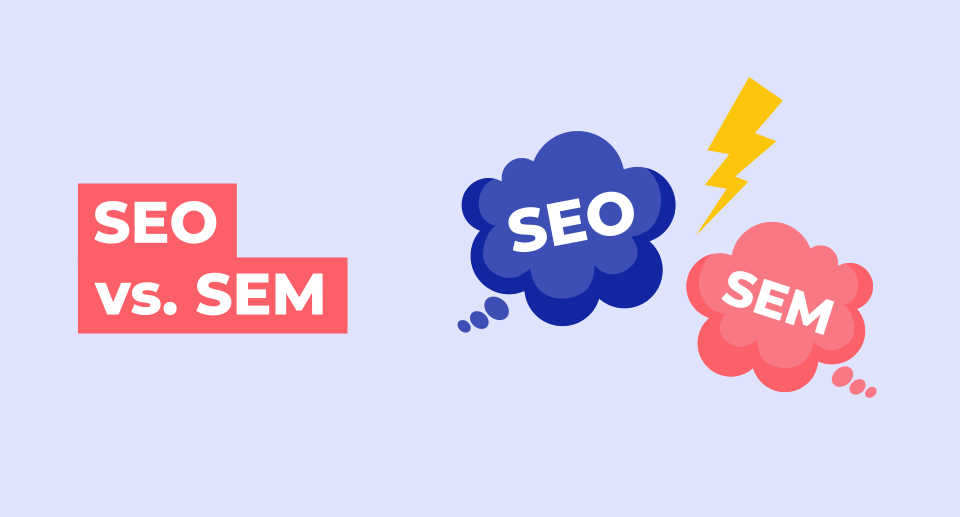It is possible that the only area that uses more acronyms and initialization than web marketing is the military.
The military uses them to save time.
Sometimes our industry seems to use them only to confuse newcomers.
And it is not uncommon for even experienced professionals to mix them up.
Some of the most common mistakes occur when it comes to similar and related but distinctly different concepts of search engine optimization (SEO) and search engine marketing (SEM).
Once upon a time, in the quiet days of the early internet (i.e. around 2001), SEO was about part of SEM.
But as the language and nuances of web marketing have changed, search engine marketing has begun to address a specific type of digital marketing. So what’s the difference?
It is sometimes called both organic (SEO) and inorganic (SEM) search, and both focus on using Google (and to a lesser extent other search engines) to drive traffic to a particular website.
From a high-level view (and don’t worry, we’ll dive into the details a little later), SEO is the process of improving your website to generate traffic, while SEM uses paid methods to show up in searches.
Don’t feel bad if you’ve confused these terms. It happens all the time.
To help you avoid embarrassing accidents when talking to other digital retailers, we’ve put together this handy guide to give you an overview of these concepts.
Confused? Don’t be, everything will be clear in the end. Now let’s go.
PPC, Another Variable In The Mix
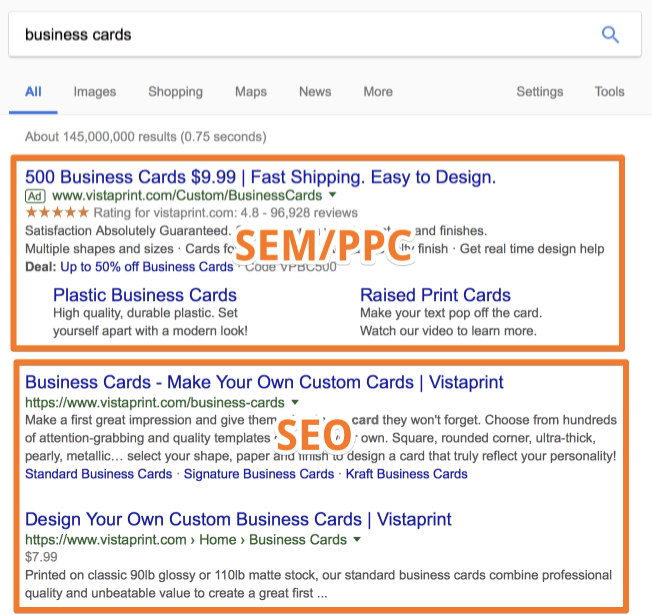
When we start, just to make things even more confusing, let’s add another initialization to the mix: PPC or pay per click.
Okay, that’s not very fair because PPC is just another term for SEM – or at least part of it.
PPC is most likely a term that evolved during the early search engine strategies in the Wild West when different people used different terms to denote the same thing.
Finally, pay-per-click and search engine marketing began to mean the same thing: paid digital marketing ads on search engine platforms.
Pay-per-click, whether called PPC, CPC (cost-per-click), paid search, or search ads refers to paid search marketing, usually through search engines such as Google and Bing.
Other terms and tactics used in digital marketing initiatives – especially those related to search marketing tactics (both paid and organic) – may not be as simple and clearly defined.
What’s The Difference Between SEO & SEM/PPC?
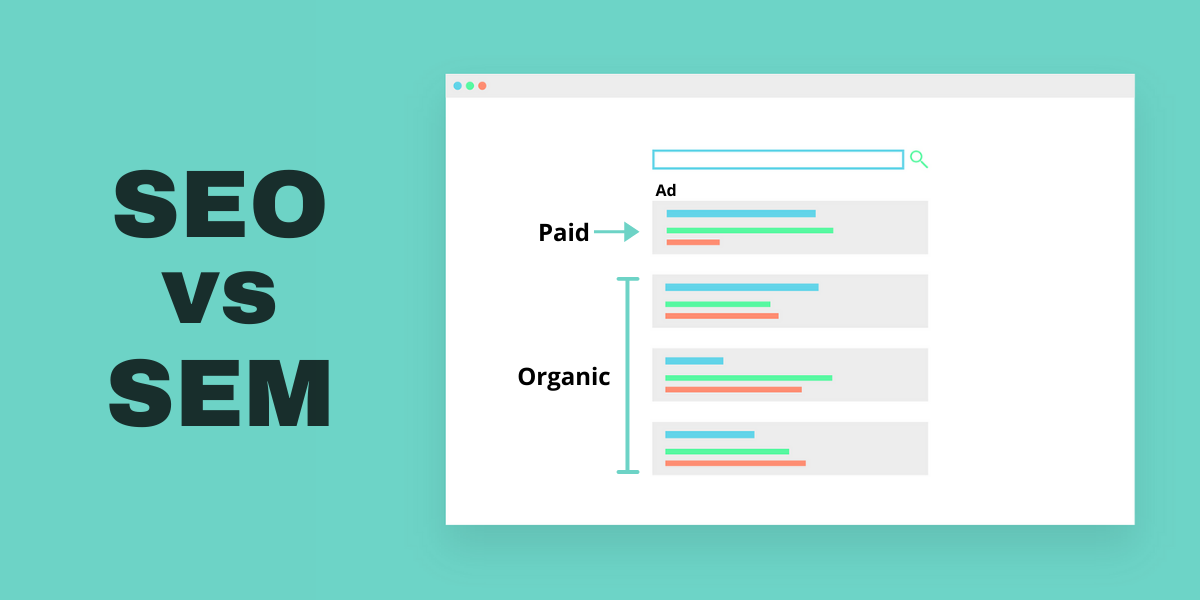
We know that SEO is search engine optimization.
However, marketers do not optimize search engines. We optimize content and websites for search engines (and people, too) to better understand, access, and direct search engines to our website.
Again, initialism doesn’t always make sense. So, of course, this is a bit illogical.
Just like other things in life that don’t always add up, there are some abbreviations that will never make sense.
Like Humvee, which doesn’t mean words that start with U or E in themselves. (It’s actually an acronym for High Mobility Multipurpose Vehicle, derived from the original acronym, HMMWV.)
We also found that PPC marketing (at least for now) is the same or a very large part of SEM. Here’s where they overlap:
But while Wikipedia defines SEM as “a form of internet marketing that involves promoting websites by increasing their visibility on search engine results pages (SERPs) primarily through paid advertising,” it’s not so quick to call them the same.
In fact, pay-per-click marketing has its own Wikipedia page separate from search engine marketing (despite the fact that there is a lot of disagreement and confusion throughout the page).
While PPC is usually the largest and most demanding component of SEM, both PPC and SEM are paid initiatives that offer real-time data, ROI, and protected data that can only be accessed by advertisers on certain platforms.
Why It Matters
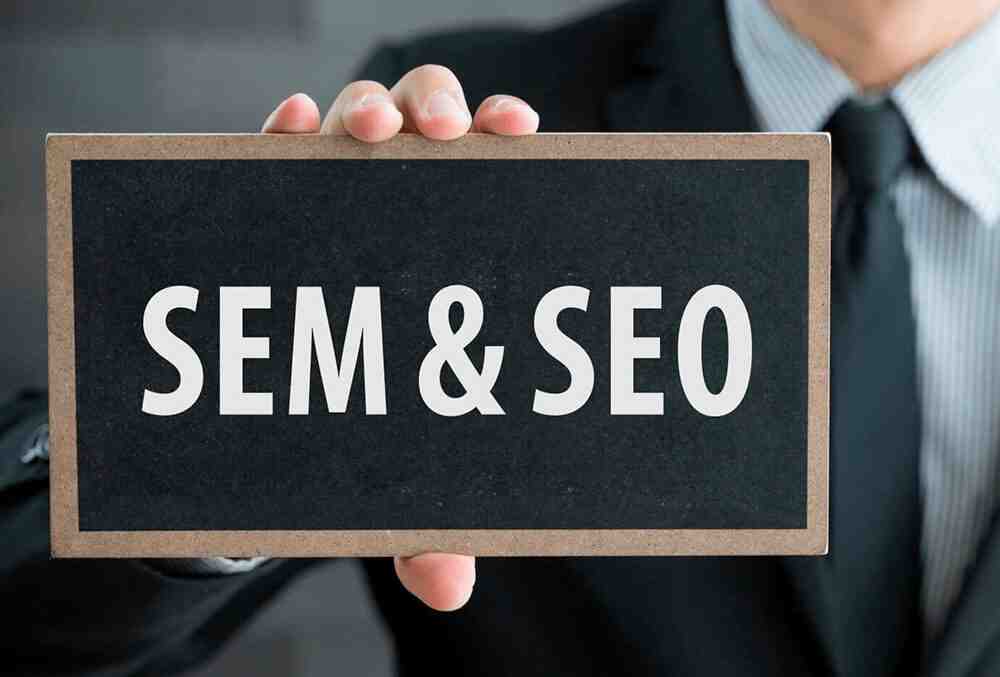
Consistency is the main reason why it is important to clarify these concepts.
Too many marketing novices or marketers who are not experts at maximizing value through search have adopted these industry definitions and crossed them out, combined them, confused them, or used them in a way that only further diluted their true meaning.
Even well-experienced marketers who simply disagree or don’t even fully understand the terms also help contribute to the turnaround.
Conferences have set up entire segments of their educational offerings in line with the SEM naming convention when it comes to strictly paid marketing efforts, but these efforts are not done solely through search engines.
SEM, at least from this perspective, includes PPC ads on search engines, but also on third-party platforms such as Amazon and YouTube, as well as industry-oriented platforms such as Houzz, Thumbtack or Yelp. It also includes display ads and remarketing efforts.
And as the opportunity to advertise on social media continues to grow, it is also commonly used for paid advertising on those networks.
Here at Search Engine Journal we are doing our part. Maintaining consistency of definitions and their use will be the best way to organize information in a way that makes sense to traders.
It also helps us, as traders, to convey our thoughts and ideas to clients and stakeholders, colleagues or a friend who is curious about exactly what we are earning.
But you should never assume that someone else knows what you mean when you use these terms.
Be concise and explain exactly what you are talking about and make sure everyone agrees on definitions.
Before we move on, let’s repeat:
Now that we’ve solved that, let’s move on.
Should I Use SEO Or SEM?

Now that we hopefully understand the differences between SEO and SEM, you are no doubt asking yourself: Which one should I use?
But if you don’t have bandwidth and can only choose one, here are a few things to consider:
What Are Your Goals?
If you want to drive traffic quickly, whether you’re promoting sales, trying a new offer, or just giving your website more exposure, SEM is the choice for you.
SEO, on the other hand, is a marathon, not a sprint. It takes more time to show results, but it is good for long-term growth and increasing value.
What Is Your Budget?
Obviously SEM campaigns will cost you money. After all, there is a reason why it is called pay per click.
If your budgets are small or you have low product margins, it may not make sense to run SEM.
SEO, on the other hand, is more of a time than a financial investment. And you can probably hire people who are already on your payroll such as writers, IT staff and salespeople to help you.
How Is Your Site Currently Performing?
If your website is already ranked high for your keywords, your SEO needs will be primarily driven by changes in Google’s algorithm and competition.
In this situation, SEM is a great increase. On the other hand, if you’re not getting a lot of organic traffic, you probably need to get your SEO in order before you start spending money on paid ads.
How Much Data Do You Have Or Need About Visitors?
SEM allows you to collect a lot more visitor data than organic search.
You can run your PPC campaigns through dashboards such as Google Analytics, where you can see clicks, impressions, CTR, sessions, conversions, and more.
You can then use that data to track trends and attract new customers.
How Is Your Online Reputation?
SEO is a great way to control the story of your brand.
Using the same techniques you use to climb to the top of the search rankings, you can control the way your organization is seen online.
In one well-known (though unsuccessful) example, UC-Davis paid a consulting firm $ 175,000 to clean up the internet of negative posts.
Of course, if you can swing, you should combine SEO and SEM as complementary search strategies.
This way, you can use the data you collect from your PPC campaigns to improve your SEO campaigns. This will give you a better idea of what exactly your audience is looking for when they click on your links, so you can tailor your content accordingly.
Combining both practices also allows you to create remarketing campaigns.
If your SEO work encourages visitors but you don’t see the conversions you want, you can use SEM to actively achieve those goals and bring them back to your website.
Pairing SEO and SEM can also allow you to completely dominate search engine results pages (SERP).
If you have the highest ranking on the first page of results, plus paid ads on the same page, you just requested a lot of real estate.
The downside, however, is that your paid ads can cannibalize your organic traffic, costing you unnecessary money.
Conclusion
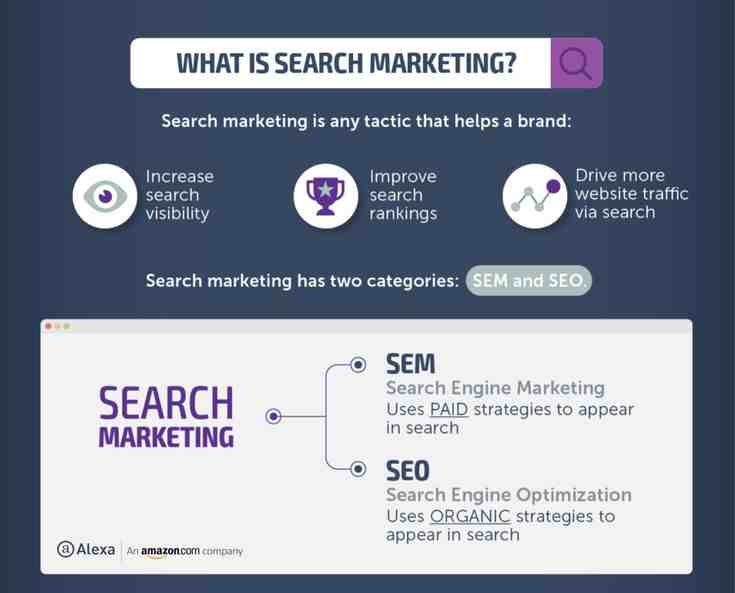
We hope we have successfully impressed you so far with the difference between SEO and SEM. But in case it wasn’t clear, here’s one more thing for the people behind:
SEO uses unpaid tactics to organically drive traffic to your website. It is a slower process (usually three to six months) but can pay long-term dividends.
SEM, including PPC, is the use of paid search platforms to drive targeted traffic to your website. It requires a budget, but can achieve results very quickly.
Too many people either perceive them as the same thing or as completely separate initiatives and miss the benefits of sharing.
For best results, both should be part of your digital marketing strategy.
Each of them has different advantages and disadvantages, but when properly combined, they can give you a real competitive advantage.
Featured image: Krakenimages.com/Shutterstock
Is SEO better than PPC?
SEO can give you consistent results and increase the authority and value of your website. While PPC can give you instant results with a highly targeted audience over a time sensitive period even if your website is not designed for SEO. SEO is very profitable and gives you a much higher return on investment.
Is SEO bigger than PPC? SEO versus PPC ROI We’ve seen that SEO clickthrough rates are higher than PPC, which means it has the potential to attract significantly more organic traffic in your way. In addition, your cost-per-acquisition (CPA) will be much lower using SEO than PPC.
What are the advantages and disadvantages of SEO compared to PPC?
| Green = Advantages Red = Disadvantages | |
|---|---|
| SEO | PPC |
| High uncertainty | Growth is tied to the budget |
| Less customer oriented | Not great for brand awareness |
| Difficult for A / B testing | Less control over content |
What is difference between SEO and PPC?
PPC vs. SEO – What’s the Difference? In short, SEO is the way you bring organic traffic to your website through website optimization. PPCs are the ads you pay for and they appear at the top and bottom of search engine results pages – SERPs. Alternatively, they are displayed on other websites.
Is Google ads and PPC same?
Google Ads is Google’s pay-per-click (PPC) advertising solution, which allows companies to bid on keywords for the opportunity to run ads on Google search results.
Is SEO better than AdWords?
Adwords is more direct than SEO because you can create advertising campaigns almost instantly and start getting targeted traffic, while with SEO you need a lot more time (especially for new websites) to get good rankings and traffic.
Does PPC traffic help SEO?
Although PPC does not directly affect SEO, it indirectly helps you improve your SEO campaigns. By investing in PPC and SEO, you will help create a cohesive marketing campaign that develops your business.
Does PPC increase SEO ranking?
You want to maximize your end result. Considering different digital marketing strategies such as PPC and SEO is not only smart, it sets your business apart from the crowd. That question has a somewhat complicated answer. But in short, no, PPC doesn’t help with SEO results … at least not directly.
What is the relationship between SEO and PPC?
Synergy between PPC and SEO increases visibility. This is an obvious advantage: you will enjoy increased exposure on search engine results pages (SERPs). Many companies reduce their PPC budget for a keyword when they organically reach the top position for it. But it can lead to loss of sales.
Why would you prefer PPC over SEO?
Advantages of PPC: PPC gives fast results. Once your PPC campaign starts, you should start seeing more traffic, clicks, and conversions right away. SEO can take months before you start to see your website moving up in search engine results. Your PPC account can be controlled.
Should I do PPC or SEO?
If your goal is to drive traffic to your site in the short term, you can choose to focus on PPC ads. If you want to improve your business’s online presence in the long run, SEO is the answer. Alternatively, invest your time and energy in SEO and PPC for a well-rounded strategy.
What is KD in blogging?
KD stands for & quot; Keyword Difficulty & quot; and represents an estimate of how difficult it would be to rank on Google’s 1st page (known as the Top 10 Search Results) for a given keyword.
What is KD in content writing? KD stands for “Keyword Difficulty” and is an estimate of how difficult it would be to rank on Google’s 1st page (known as the Top 10 Search Results) for a given keyword.
What is PD and SD in SEO?
PD indicates a paid difficulty or scale of 1 to 100 that tells you how difficult it is to rank for that keyword in Google Adsense. SD stands for SEO, Volume tells you the monthly search amount, and CPC stands for cost-per-click, also for Google Ads.
How much keyword difficulty is a good?
KDS Between 30% and 70% – Moderate Keywords These will usually have a good search volume (hence the difficulty), but not so much competition that it is not feasible. So, this is your best choice when it comes to choosing the right keywords because you have a realistic chance of competing for them.
What is a good keyword priority score?
Priority should be used to help you determine which terms and phrases you want to target first – it’s like a cheat code to unlock a hanging fruit. If you compile large lists of 50-100 or more keywords, priority is a powerful and easy way to sort.
How much should be the keyword difficulty?
It is displayed as a percentage, ranging from zero to 100. A score of zero means that the keyword would be very easy to rank, while 100 is the most difficult.
How much keyword volume is good?
What is good keyword search volume? As with all things SEO, it depends. The simplest answer is to strive for a minimum range of 100 to 1000 searches per month.
Is higher keyword difficulty good?
Keyword difficulty (also known as keyword competition or SEO difficulty) is an SEO metric that assesses how difficult it is to rank a keyword. The higher the weight of a keyword, the harder it is to rank on the 1st SERP due to the high competition of ranked websites.
What does KD mean in SEO?
Keyword Difficulty (KD) is a metric that tells you how much SEO effort it might take to organically rank a page in the top 10 results on Google for a particular keyword.
How do I find low kd keywords?
How to find low competition keywords with Semrush [SUPER EASY]
- Make your initial keyword list. Start with: Positions for Organic Research. …
- Expand your keyword list. Sign in to use: Keyword Magic Tool. …
- Filter for high volume keywords with less competition.
What is a good SEO difficulty score?
KDS Between 30% and 70% – Moderate Keywords So, these are your best when it comes to choosing the right keywords because you have a realistic chance of competing for them. And they also have a large search volume, it’s worth your time to target them.
What is a good keyword score?
30-49: Possible. For these keywords, you will need quality content that is not only well optimized for your targeted keywords, but also very well organized, with good structure.
What does kd stand for Ahrefs?
Ahrefs Keyword Difficulty (KD) is based solely on the number of reference domains that link to the highest ranking pages for your targeted keyword.
What is difference between SEO and SEM Mcq?
16. What is the generally accepted difference between SEO and SEM? SEO is usually a West Coast term, except for the East Coast.
What is the difference between SEO and SEM? SEO is sometimes used as an umbrella term that includes SEM, but since SEM refers strictly to paid advertising, they are actually separate. SEM refers to getting traffic through paid ads, and SEO more to acquiring, tracking, and analyzing samples of organic (unpaid) traffic.
Which one should you do to increase your Google page rank Mcq?
28) What should you do to increase your Google Page Rank?
- A. Create rich keyword text.
- Speed up website loading time.
- C. Get backlinks from high-ranking websites.
- D. All of the above.
Which is the best way to improve search engine ranking Mcq?
Have at least 500 words of text per page. Use a lot of graphics per page.
Which of the following is valuable in increasing PageRank Mcq?
| P. | Which of the following is valuable in increasing page rank? |
|---|---|
| B. | static content |
| C. | the amount of links from other high-ranking sites to your site |
| D. | None of the above |
| Answer »c. the amount of links from other high-ranking sites to your site |
What is SEO MCQS?
Internet MCQ: SEO (search engine optimization – multiple choice questions)
What is the generally accepted difference between SEO and SEM co3 *?
SEO is usually the term West Coast, SEM is more East Coast.
Are SEO and SEM integrated?
The most successful search campaigns are collaborative and integrate organic and paid search. Both SEO and SEM basically have the same goal of driving traffic to your site. Connecting them not only makes sense, but also gives you better reach and visibility in the digital space.
What is the generally accepted difference between SEO and SEM?
The main difference is that search engine optimization (SEO) focuses on optimizing a website to get traffic from organic search results. On the other hand, the goal of search engine marketing (SEM) is to get traffic and visibility from organic and paid search.
Which of the following factors have an impact on the Google page rank?
Which of the following factors affect Google PageRank? Explanation: The total number of inbound links to a website page is factors that affect Google PageRank.
Why SEO and SEM should work together?
So what can SEO and SEM achieve together? The most ideal result for sharing SEO and SEM is for your site to reach top organic SERPs, and your business also increases visibility through ads. Here, users have the decision to click on your ad if it is relevant to them or your organic result.
What is SEO Mcq?
| AND | It’s not going to happen |
|---|---|
| D | search engine optimization |
What is SEO and its purpose?
SEO stands for “Search Engine Optimization”. It is a practice to increase the quality and quantity of traffic to a website, as well as exposure to your brand, through unpaid (also known as “organic”) search engine results. Despite the acronym, SEO is as much about people as it is about search engines themselves.
What is SEO Answer?
What is SEO? The practice of optimizing the architectural look of a website is known as SEO. It helps in the relevance of content and attractiveness of links so that its pages are easier to find, more relevant, more prominent in response to the use of web search, and therefore have a higher ranking in search engines.
What is SEO in simple words?
SEO is an acronym for search engine optimization – so much has remained the same. It refers to techniques that help your website rank higher on search engine results pages (SERP).
What is SEO in Mcq?
Internet MCQ: SEO (search engine optimization – multiple choice questions)
How SEO is different from SEM explain with examples?
The main difference between SEO and SEM is this: SEO is free and relies on organic search strategies, while SEM has price and relies on paid advertising. In addition, SEO takes time to take effect, while SEM is current.
What is SEM with an example? SEM or search engine marketing is a subset of digital advertising, associated with site targeting for ranking on paid search engine results pages. PPC or pay-per-click refers to a purchase model in which advertisers pay a fee for each click their ad receives.
What is the difference between SEO and digital marketing?
SEO is a digital marketing tool. Search engine optimization primarily focuses on website ranking. Digital marketing aims to encourage and promote a brand through various digital channels such as websites, social media, email, etc.
What is digital marketing and SEO?
It is the process of getting traffic from free, organic, editorial or natural search engine results. Simply put, it is the name for an activity that tries to improve search engine rankings. In many respects, it is simply the quality control of the website.
Is SEO necessary for digital marketing?
by Digital Marketing Institute SEO consists of several elements, and knowing what they are and how they work is key to understanding why SEO is so important. In short, SEO is key because it makes your website more visible, which means more traffic and more opportunities to turn potential customers into customers.
What is the difference between marketing and SEO?
SEO refers to the technical process of increasing the quality of traffic and attracting the maximum number of visitors to your website. On the other hand, content marketing is focused on using valuable and relevant content to encourage profitable user or client action.
What is SEO and SEM marketing what are the differences?
What is the difference between SEO and SEM? The main difference is that search engine optimization (SEO) focuses on optimizing a website to get traffic from organic search results. On the other hand, the goal of search engine marketing (SEM) is to get traffic and visibility from organic and paid search.
What is the difference between SEO and digital marketing?
Search engine optimization primarily focuses on website ranking. Digital marketing aims to encourage and promote a brand through various digital channels such as websites, social media, email, etc. SEO is free, but in general digital marketing may not be!
What is SEO and SEM and how it works?
SEO is search engine optimization that works to improve website visibility and generate organic reviews. SEM is a search engine marketing that also improves the visibility of a website through ads, and website owners have to pay according to the number of clicks on the ads of their website.

